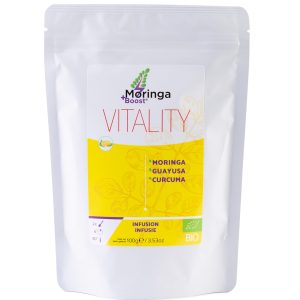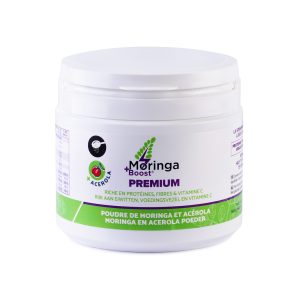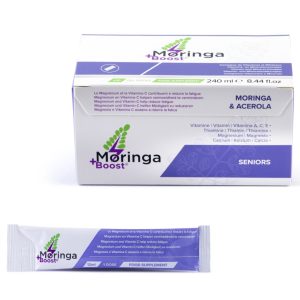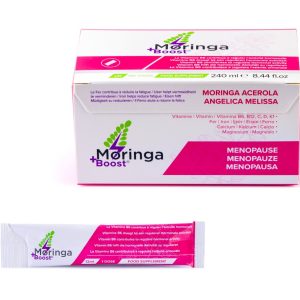Free radicals are tiny reactive particles that form naturally in the body as a result of various metabolic processes. Although they are needed in limited quantities for certain biological functions, their excessive accumulation can cause damage to cells and tissues, contributing to a variety of health problems, including premature aging and chronic disease.
Fortunately, nature offers a powerful solution to counter these free radicals: moringa, a plant renowned for its rich antioxidant content. In this article, we’ll explore free radicals in detail, their damaging effects on health, and how moringa, thanks to its high antioxidant content, can offer valuable protection for our well-being.
● Understanding Free Radicals
Free radicals are unstable molecules with an unpaired electron. To achieve stability, they react with other molecules, including cellular components such as DNA, proteins and lipids. When these reactions occur uncontrollably, they can damage these vital molecules. Sources of free radicals in the body include metabolism, inflammation, exposure to ultraviolet light, air pollution, smoking, and stress. Free radicals contribute to a variety of health problems, including :
- Premature aging: free radicals damage skin cells, causing wrinkles, age spots and a dull complexion. Moringa’s antioxidants help prevent premature aging, just like the recognized benefits of purple potatoes.
- Cardiovascular disease: free radicals oxidize LDL (“bad”) cholesterol, which can harden arteries and increase the risk of heart disease.
- Neurodegenerative diseases: cellular oxidation caused by free radicals is implicated in conditions such as Alzheimer’s and Parkinson’s disease.
- Inflammatory diseases: Free radicals contribute to chronic inflammation, a key factor in many diseases, including type 2 diabetes and autoimmune diseases.
- Cancer: DNA damage caused by free radicals can contribute to the development of cancer cells.

● Antioxidants and their key role
Antioxidants are compounds capable of neutralizing free radicals by providing them with the missing electron, thus rendering them harmless. Antioxidants play a crucial role in protecting cells and reducing oxidative damage. Some of the most commonly known antioxidants include vitamins C and E, beta-carotene (Vitamin A), selenium and various phytochemicals found in plants.
Moringa, also nicknamed the “miracle tree”, is exceptionally rich in antioxidants, particularly vitamins A, C and E, making it a prime ally in the fight against free radicals. Moringa’s antioxidant action is comparable to that of green tea, renowned for its health benefits. In addition to Moringa, sweet potatoes are also rich in antioxidants and contribute to a balanced diet.
● Moringa: A natural antioxidant weapon
Moringa is a plant that grows mainly in tropical and subtropical regions, and more recently in southern Europe. All its parts, from leaves to seeds to roots, are rich in nutrients and antioxidants. Moringa’s main antioxidant compounds include :
- Vitamin C: Vitamin C is a powerful antioxidant that protects cells against damage caused by free radicals.
- Vitamin E: Vitamin E, present in moringa, protects cell membrane lipids against oxidation, maintaining their integrity.
- Beta-carotene: Beta-carotene, a precursor of vitamin A, is essential for healthy skin, eyes and immune system.
Moringa is an exceptional source of beta-carotene, surpassing even sweet potatoes, known for their high content. Compared with sweet potatoes, Moringa offers superior nutritional value, with a higher concentration of vitamins and minerals.
● The benefits of Moringa thanks to its antioxidants
The antioxidants found in moringa offer a range of health benefits, including:
- Protection against premature aging: Moringa’s antioxidants protect the skin against free radical damage, reducing the appearance of wrinkles and age spots.
- Cardiovascular support: Moringa may help reduce oxidation of LDL cholesterol, thus contributing to cardiovascular health.
- Immune support: Antioxidants strengthen the immune system, helping the body to fight infection and disease.
- Reduced inflammation: Moringa’s antioxidant compounds help reduce inflammation, which can be beneficial for people suffering from inflammatory diseases. Moringa’s anti-inflammatory properties can relieve joint pain, similar to the effect of omega-3-rich foods.
- Eye health: The beta-carotene present in moringa is essential for eye health, helping to prevent age-related macular degeneration.
Moringa contains essential trace elements that protect cells against premature aging. Its nutritional value makes it an ideal candidate for combating malnutrition, especially in its powder form, which is easy to incorporate into a variety of dishes.
● Conclusion
Free radicals can contribute to a range of health problems, from premature aging to chronic disease. Antioxidants play a key role in fighting these free radicals, protecting our cells and tissues from oxidative damage. Moringa, a plant exceptionally rich in antioxidants, offers a natural solution for fighting free radicals and promoting optimal health.
By incorporating moringa into your diet, you can enjoy its antioxidant benefits, including protection against premature aging, cardiovascular support, immune stimulation, inflammation reduction and preservation of eye health. Moringa is a valuable natural resource that can help protect your body from free radical damage and keep you healthier and fitter.
Feel free to explore the different ways you can incorporate moringa into your diet and enjoy its many health benefits.
● References
- Rich in antioxidants : Nutritional and Antioxidant Properties of Moringa oleifera Leaves in Functional Foods — PMC
- Anti-inflammatory properties: Bioactive Components in Moringa Oleifera Leaves Protect against Chronic Disease — PMC
- Fighting malnutrition: Moringa oleifera: A review on nutritive importance and its medicinal application










